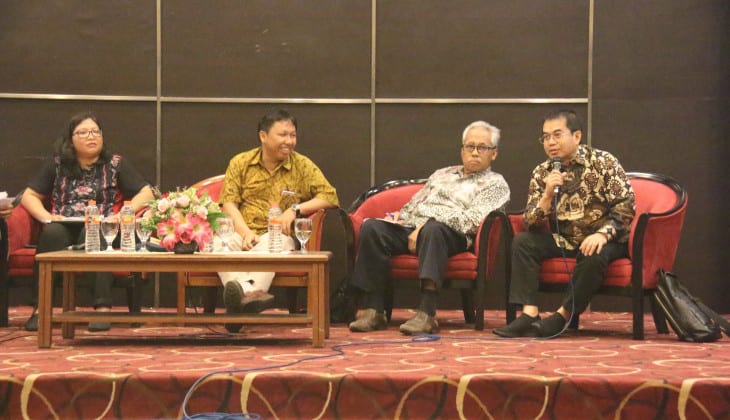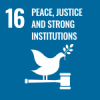
The Research Team from the Faculty of Law, Universitas Gadjah Mada (UGM), delivered a research about the politicization of religion in the formation of various legal regulations in Indonesia. Although the regulations regulate policies on morality and religion, the rules that contain religious politicization elements have increased from year to year. “Since 2017 there have been 471 legal regulations,” said Sri Wiyanti Eddyono, Ph.D., one of the research members, when presenting her research at the National Seminar on “Law and Ideas of Indonesian Nationality in the Context of Identity Politics Vortex” on Monday (18/2).
She said from 1999 to 2004 as many as 56 regulations were considered politicization of religion. In 2010 the number increased to 156 regulations and to 471 in 2017.
According to him, the increasing tendency of religious politicization is due to the state’s democratic space. Therefore, religious politicization is carried out by politicians, regional heads and mass organizations to reach certain positions so they include rules in the context of religion into the state structure. “They did so by asserting that those who did not comply were considered against religious teachings,” she said.
The politicization of religion not only appears in the law, but also in the practice of daily community life such as intolerance and verbal and physical violence. In fact, in the courtroom, it is common for judges to andle various religious blasphemy cases. “In the national context, there are 97 decisions on blasphemy cases in district courts,” she said.
The research has been conducted since 2006 on intolerance, blasphemy cases and sharia-based regulations in Padang, DKI, Medan, Cirebon, Klaten, Depok, and Yogyakarta through interviews and observations. Based on the findings, there are rules that contradict with Pancasila in the name of religious teachings. In Yogyakarta, findings showed that some state junior high schools forced headscarves on Muslim students. In Medan, it was found that the attitude of campus-based primordialism was increasing, temples were burned and there were 20 cases of blasphemy. In Cirebon grouping based on religious rules was found and radical ideology spread among young people and kindergartners.
The seminar in the context of the 73rd Anniversary of the Faculty of Law UGM presented other speakers, Prof. Amin Abdullah from UIN Sunan Kalijaga, Drs. Yudi Latif MA PhD., and Dr. Rikardo Simarmata from the Faculty of Law UGM. Yudi Latif said that Indonesia is the only country in the world that practices a nation state since its establishment through Pancasila. “Pancasila solves problems through the equality of citizens before the law,” he said
He said, not all groups are accommodated because it violates the principle of equality. Pancasila protects minority and marginal religions, ethnicities, races and cultures. “There are times when particularity cannot be completed by universal ways. There is protection of certain cultural rights. Pancasila prepares that cultural space, but for the sake of justice the common law emerged, although many religious inspirations are sometimes rejected when forming a law,” he said.
Rikardo Simarmata said that primordial identity politicization generally has the potential to disturb the joints of the law because it denies the existence of an inseparable relationship between law and diverse interests, “Our current legal system is challenged to reach a civilized life,” he said.
Legal cases surrounded by identity politics often result in judges being unable to give appropriate decisions and giving a sense of social justice based on human values. “In many cases, judges no longer view evidence presented in court,” he said.
Prof. Amin Abdullah said that the era of freedom of speech during the Post-Soeharto era fosters attitudes of exclusivity, intolerance towards others, inclusivism, and pluralism in modern concepts as it views all human beings as equal in law, ethnicity, and gender. According to him, Indonesia is fortunate to have Pancasila as a guide in which we can live harmoniously in pluralism and diversity. “That is Indonesia’s extraordinary cultural and social assets,” he said.
Increased religious politicization has an impact on exclusivity and inclusiveness and should be the concern of the state and all parties including the tertiary institutions. “Universities and colleges must sit together to solve this problem, especially since many campuses have been exposed to radicalism,” he concluded.
Source: https://www.ugm.ac.id/id/berita/17688-menguatnya-politisasi-agama-dalam-produk-hukum-di-indonesia



